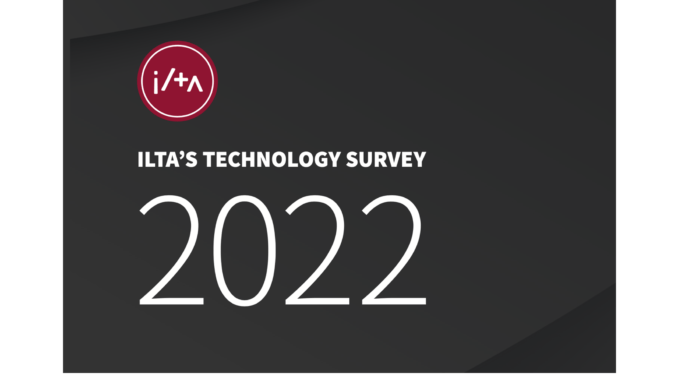
It’s that time of year again and the 2022 ILTA Tech Survey is here. Artificial Lawyer got a peek at some of the results, which perhaps can be summed up as: more AI; that moving to the cloud remains an ongoing slog; and there is a growing demand for lighter laptops…..and yes, the last one is real.
Let’s start with the fun one. ILTA asked over 540 law firms how they selected laptops and the number one factor in making a buying decision is how much it weighs. Moreover, weight went from 49% in 2021 to 53% in 2022 as ‘the most important’ factor. The laptop’s operating system was in a lowly 10th position in terms of importance.

But why the growth in the need for lighter laptops? Maybe after two years of the pandemic and extended working from home we’ve all got a little bit less fit, and so need our laptops to be even lighter than before? (But are they really that heavy…? And maybe we could use lugging laptops around as part of our new post-Covid era fitness regime?)
We Need to Talk About AI, (Or In Fact Maybe We Don’t…)
The next notable item is that when asked what will create ‘significant change’ for the ‘legal technology profession’, AI and ML tools came second and also saw a significant rise in importance, rising from 15% in 2021 to 22% in 2022.
Athough some law firms are already way beyond thinking about NLP software in total isolation – and rather see it is as simply a fact of life and part of the whole. Focusing on the AI component in a tool you are using is a bit like obsessing over the engine in your vehicle, after a while you just accept there is an engine in your car and you get on with driving.
As long as users of such technology are aware that 1) it’s not perfect, and 2) that this imperfection can still be very effective when applied in the right use cases, then there’s not too much to think about.
As to training, again it’s not really a biggy. Most systems where the use case will demand some level of training e.g. transactional doc review, have fairly standard ways of highlighting text and teaching the NLP what to look for.
In short, it’s not really a tech problem, if anything it’s more about getting the lawyers to understand the limitations of the tech and also how it can still be extremely useful. It’s then about staffing up any training you need and figuring out the billing approach you will take for work that has been sped up – if that work is even billable by the hour.
It’s Looking Cloudy
Meanwhile, the number one area of interest in terms of what will create significant change is…..cloud, with this area rising in importance from 16% in 2021 to 25% in 2022…..and that’s surprising as one would have assumed that the whole question over the use of cloud-based tech was done and dusted a long time ago, and that this would not even be an area of discussion. And yet, clearly we are still working our way through this.
Additional survey results from ILTA showed a surprising level of low uptake of cloud-based software at law firms across several areas. For example, even among law firms with more than 700 lawyers, only 12% said that something as basic as accounting software was in the cloud now or being transferred there in the next 12 months.
Interestingly, smaller firms had much higher cloud levels for basic stuff like accounting, e.g. firms with less than 50 lawyers had 44% with cloud-based accounting software, or with a plan to have that approach in 12 months.
Why is this…?
One answer is that large law firms are still wedded to old software – which they have spent a fortune on over the years. While the smaller, more agile law firms – which are also more cost-conscious – are using modern accounting software that is very often cloud-based.
And this reveals something very important: that a lot of large law firms are likely not using cloud technology as much as one might assume – but that this is not because of the cliché about security, but rather that they have gone deep with old software that they don’t feel they can change.
They’ve spent a lot on those legacy systems and moving to the cloud – although this could drive efficiency and if they’re lucky see cost reductions – is hard to do as there is an inherent lethargy around dumping well-developed ways of working with tried and tested, albeit perhaps clunky, old software.
So, there you go. There is a lot more in the ILTA survey and this is just a small taste of a much larger report. The full survey will be on sale to members and non-members via ILTA.
—
(Demographics: This year’s survey reports the input of 541 firms representing about 26,000 attorneys and approximately 275,000 total users.)